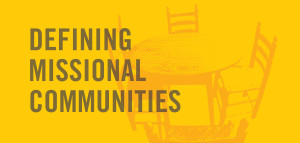Here are notes from my workshop session at the Church of the Brethren church planting conference held at Bethany Seminary in Richmond, IN.
I. Introduction of Self
a. Husband of Kim
b. Father of Kaiden and Trinity
c. Missional Church planter with Veritas in Lancaster, PA
II. Sharing of Scripture and Prayer
1. Genesis 12:1-3
2. Jeremiah 29:1-7
3. John 20:21
Prayer
III. What is and what isn’t missional?
What missional isn’t:
1. Missional isn’t a new way to talk about church growth or a church growth strategy.
2. Missional isn’t the same as evangelistic or seeker- sensitive.
3. Missional is not synonymous with emerging.
4. Missional is not a trendy word to add onto other things.
ie…missional coffee, missional lighting, missional seating.
5. Missional is not a program or a project
6. Missional is more than just social justice.
7. Missional isn’t a quick fix or a magic bullet to turn your church around.
8. Missional isn’t a Hip new way of doing and being church.
9. Missional isn’t limited to institutional activity
10. Missional isn’t a new way of doing Sunday morning.
What missional is:
1. Missional means being sent.
2. Missional takes it’s cue from the Missio Dei (the mission of God)
3. Missional is about the missionary nature of God.
4. Missional means participating with God in what God is doing in the world.
5. Missional is a way of living, not an affiliation or an activity.
6. Missional is about the people of God partnering with him in his redemptive mission in the world.
7. Missional is an integration of blessing and disciplemaking (the two great commissions)
8. Missional is about the church being missionaries in the world.
9. Missional means that we are passing through this life [in Biblical language as sojourners, wanderers, aliens, foreigners, strangers or ambassadors] with a sense of purpose, duty, passion, and responsibility for the ‘mission of God.’”
10.Missional is an adjective describing all of the activities of the church body as they are brought under the mission of God to proclaim the good news of salvation through His Son Jesus Christ.
IV. Constantine, Christendom and Post-Christendom
1. Constantine- Roman Emperor who made Christianity the official religion of the empire in 313 with the Edict of Milan. Apparently converted to Christianity during a battle when he had a dream where he was advised "to mark the heavenly sign of God on the shields of his soldiers ... by means of a slanted letter X with the top of its head bent round, he marked Christ on their shields.” Christendom started in 313 with the Edict of Milan.
2. Christendom- Refers to the Middle Ages of Western Europe when all of society (church, state, schools, work, art) was united under the umbrella of Christianity. All of life-work, commerce, education, politics, family and money- was ordered toward the church and around the core beliefs of Christianity.
Christianity moved from being a marginalized, subversive, and persecuted movement secretly gathering in houses and catacombs to being the favored religion in the empire.
Overall, Christianity moved from being a dynamic, revolutionary, social, and spiritual movement to being a religious institution with it’s attendant structures, priesthood, and sacraments.
We will see that we are definitely moving rapidly from Christendom to post-Christendom in a few minutes. The Christendom story, as we shall see, no longer defines Western Culture, but still remains the primary definer of the church’s self-understanding in almost every Western nation, including and perhaps especially the United States.
Christendom, as a paradigm of understanding, as a metanarrative, still exercises and overwhelming influence on our existing theological, missiological, and ecclesiological understandings in church circles. We still think of the church and its mission in terms of Christendom. While in reality we are in a post-Christendom context, the Western church still operates for the most part in a Christendom mode. Constantine, it seems, is still the emperor of our imagination when it comes to church and even church planting.
So let me ask a question to see how much Constantine is still the emperor of our imagination. When I show you this picture tell me what it is? If you said a church, Constantine still holds sway.
3. Post-Christendom: What is Post-Christendom?
Post-Christendom is the culture that emerges as the Christian faith loses coherence within a society that has been definitively shaped by the Christian story. The institutions that have been developed to express Christian convictions decline in influence as well.
Probably one of the best ways to understand the shift that is taking place within the western world, is to understand 7 significant ecclesiological shifts that are taking place.
1. From the center to margins: in Christendom the Christian story and the churches were central, but in post-Christendom these are marginal.
2. From majority to minority: in Christendom Christians comprised the (often overwhelming) majority, but in post-Christendom we are a minority.
3. From settlers to sojourners: in Christendom Christians felt at home in a culture shaped by their story, but in post-Christendom we are aliens, exiles and pilgrims in a culture where we no longer feel at home.
4. From privilege to plurality: in Christendom Christians enjoyed many privileges, but in post-Christendom we are one community among many in a plural society.
5. From control to witness: in Christendom churches could exert control over society, but in post-Christendom we exercise influence only through witnessing to our story and its implications.
6. From maintenance to mission: in Christendom the emphasis was on maintaining a supposedly Christian status quo, but in post-Christendom it is on mission within a contested environment.
7. From institution to movement: in Christendom churches operated mainly in institutional mode, but in post-Christendom we must become again a Christian movement.
V. Questions/Dialogue
VI. Some statistics, etc… about the shift that is taking place from Christendom to Post-Christendom.
The latest report by The American Religious Identification Survey (ARIS) indicates that the United States has been continually moving into a Post-Christendom Context.
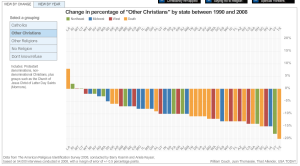
The number of Americans who do not identify with any religion continues to grow at a rapid pace. One-fifth of the U.S. public – and a third of adults under 30 – are religiously unaffiliated today, the highest percentages ever in Pew Research Center polling.
In the last five years alone, the unaffiliated have increased from just over 15% to just under 20% of all U.S. adults. Their ranks now include more than 13 million self-described atheists and agnostics (nearly 6% of the U.S. public), as well as nearly 33 million people who say they have no particular religious affiliation (14%).
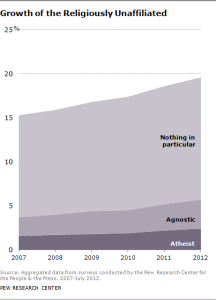
Let me show you some more statistics that prove that, while we aren’t a totally post-Christendom (or Post-Christian) country like Europe, these statistics prove that we are definitely heading in that direction, and in some places faster than others.
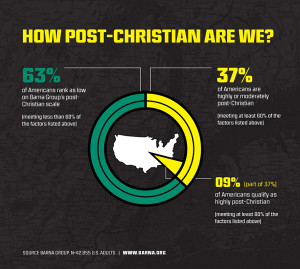
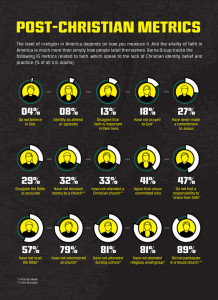
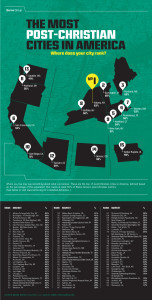
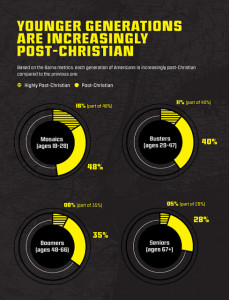
VII. Questions so far?
VIII. How does all the information about our post-Christendom culture affect the way we plant churches?
Let’s look at 3 different videos that will show us the difference between Christendom models of church planting and missional chuch planting in the midst of Post-Christendom and then take time to discuss them.
Video #1: Field of Dreams
Video #2: Attractional Church parable
Video #3: Missional Church…simple
What did you notice in these videos and what is the difference between Christendom models of church planting and missional church planting in the midst of Post-Christendom? (Discussion)
David Fitch has this to say about the struggle of planting churches in post-Christendom, “
“For much of post World War 2 North America, we have planted churches by using strategies that depend on drawing upon a market of already existing Christians. One way or another, church planting in North America has been taking what’s left of Christianity and creating new versions of church over against the failures of existing churches. We organize ourselves as “the next new thing” to make up for what some other churches lack……
We can no longer expect to successfully cannibalize on ourselves in the planting of new churches. We’re running out of Christians/churches to reform to some truer, purer more relevant form of Christianity. As I said here, lets stop funding church plants (has anyone noticed it ain’t working?) and fund missionaries here in North America. We need to seed fresh expressions of the gospel that engage those outside the faith with the gospel and create the space for God work to bring people to Himself.”
IX. What does missional church planting in the midst of post-Christendom look like (not a model because there is no one model)
Let me give you a scenario about missional church planting:
Let’s say that everyone is this room decides to move to a city where post-Christendom is the norm, and no one wants to “go to church”. Our group moves to the city in order to plant a church. What would some of the first things you do to plant the church? What would your strategy be?
Missional church planting in the midst of post-Christendom looks like this:
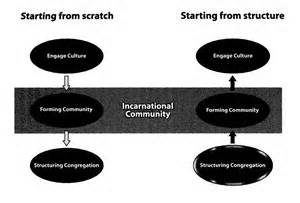 This flow works for brand new existing communities as well as 200 year old churches. It just works a different way.
Missional Church planting, starting from Scratch:
This flow works for brand new existing communities as well as 200 year old churches. It just works a different way.
Missional Church planting, starting from Scratch:
Engage Culture-Being a missionary and becoming friends with people.
Form Community- second phase of missionary engagement
Structure Congregation- “final phase” of missional church planting.
If you are at the other end with a structured congregation, you just work it backwards. You form an incarnational/missional community, they discern their missional “focus” and then begin to engage and make friends in that missional focus.
X. Missional Flow in the life of the Veritas community.
This is a little about how we live out the Missional Flow within the life of the Veritas community in Lancaster, PA.
Engage Culture- We use our space The Community Room on King as a hub to engage culture. We use it for 1st Friday Art Shows, 3rd Friday music events, just was a venue for the Launch Music Conference and Art Walk.
Form Community: Regularly held community/relationship building times like 3rd Sunday lunch, during the summer we go to the Long’s Park Summer music nights each Sunday night and invite people to go along. We encourage people to throw events (like Picnics, parties, etc… ) invite their friends, as well as some of the Veritas community.
Structure Congregation: Our Community gathers each Sunday in the Community Room on King for a worship gathering that includes time to build relationships, how we are living out this missional flow (IN, OUT, UP), message and application discussion. We are also slowly working on developing small missional communities that each have a missional focus and live the IN, OUT, UP monthly rhythm together.
XI. Mission, Discipleship and Community as Core Values within Missional Church Planting.
“The first churches were concerned with balancing equal commitments to fostering their relationships with God, with one another and the world.”
“Any emphasis on one at the expense of the others is folly. For a church to claim that it “specializes” in worship or teaching is to ignore the whole counsel of the New Testament. Worship that is is some way divorced from mission is counterfeit worship. And likewise, a missioning community that is not informed, inspired and renewed through godly worship is a pale shadow of what church should be.”
“Worship and Mission and the development of Christian community must inform each other closely and regularly.”
XII. Resources to be aware of in relation to missional church planting.
1. The Shaping of Things to Come by Michael Frost and Alan Hirsch.
2. Tangible Kingdom, Tangible Kingdom Primer, AND:The Gathered & Scattered Church, and Flesh by Hugh Halter and Matt Smay.
3. Prodigal Christianity by David Fitch and Geoff Holsclaw.
4. Post-Christendom by Stuart Murray
5. Exiles by Michael Frost
6. Forgotten Ways by Alan Hirsch
7. David Fitch’s blog: reclaimingthemission.com
8. Dan White Jr.’s blog: danwhitejr.blogspot.com
9. UnChristian by David Kinnaman and Gabe Lyons.
10. Missional Renaissance by Reggie McNeal
XIII. Contact information
Ryan Braught
717-572-5914
ryan@veritaschurchpa.org
Facebook:
https://www.facebook.com/ryan.braught
https://www.facebook.com/VeritasPA
https://www.facebook.com/CommunityRoomonKing
Twitter:
https://twitter.com/RyanBraught
https://twitter.com/VeritasPA
https://twitter.com/CommRoomonKing
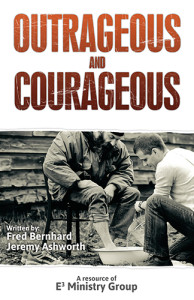 The other week I was attending the Church of the Brethren Annual Conference in Columbus, OH. I attend Annual Conference every year that it is within driving distance because I get to catch up with people that I might not see any other time during the year. I get to develop relationships with friends from California, Arizona, Michigan, Maryland, and even spend time with friends from the Lancaster area. Annual Conference gives me a chance to tell our story, network with various individuals and their churches, share with people how they can support Veritas in moving forward, as well as share any wisdom or insight I might have to others considering church planting or who are in the middle of church planting themselves.
The other week I was attending the Church of the Brethren Annual Conference in Columbus, OH. I attend Annual Conference every year that it is within driving distance because I get to catch up with people that I might not see any other time during the year. I get to develop relationships with friends from California, Arizona, Michigan, Maryland, and even spend time with friends from the Lancaster area. Annual Conference gives me a chance to tell our story, network with various individuals and their churches, share with people how they can support Veritas in moving forward, as well as share any wisdom or insight I might have to others considering church planting or who are in the middle of church planting themselves. 


